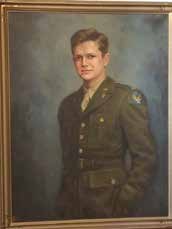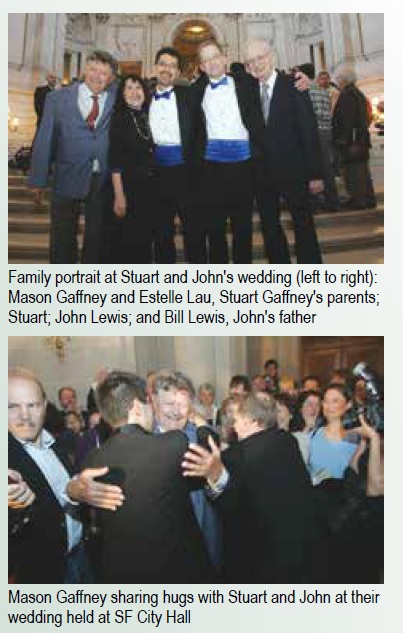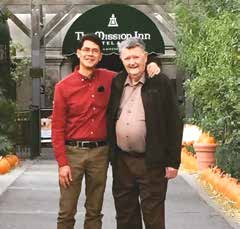
By Stuart Gaffney–
My father died last month at age 96. He was a remarkably gifted and talented economics professor, who The New York Times reported “was at the forefront” of a progressive tax-policy movement to create a more equitable society and to protect the environment. To me and my five other siblings, he was also our beloved—and charmingly eccentric—Dad.
But being the child of not one, but two, accomplished university professors carried with it pressure to match their successes. Dad, in particular, was not shy about making his expectations known, and whether I was measuring up—or not. Barely concealing his disappointment, Dad asked me on more than one occasion if I would have been more ambitious if I hadn’t read so much existentialist literature in college.

All of that changed a number of years ago in ways I never could have imagined.
When I came out to Dad over 35 years ago, it surprised me how much he struggled with it, given what a free thinker he was. In Dad’s own words, he went through “denial, guilt, and remorse” and tried everything, including “lecturing, exhorting, ‘reasoning together,’” and appealing to the need for survival of the species to try to convince me I wasn’t gay. At one point, he even told me he was concerned that homosexuality may have caused the fall of the Roman Empire.
Throughout it all, I remained patient, never giving up on our relationship. I always took his calls, and always had time to spare—sometimes hours—for his questions, lectures, and theories. At some point, Dad himself tired of his intellectual mind games and indeed my patience with him. He told me, “Stuart, I think it might be time just to tell me to f–k off.”
This was Dad’s way of telling me he finally accepted I was gay.
Dad met John 32 years ago, and soon thereafter described John to his colleagues as someone the family had “grown to love dearly.” Dad was thrilled when we got married in 2008, and at the reception not only toasted us but also apologized for letting me down and “not being there” for me when I needed him.

Dad campaigned actively to defeat Proposition 8, sending an email to numerous colleagues, including Mormon ones, with the urgent subject line: “Please VOTE NO on Prop 8! Please forward to everyone you know!” After Prop 8 passed, Dad joined a “Repeal H8” rally in Riverside County, where the anti-gay initiative had garnered nearly 65 percent of the vote.
The day after the 2016 Pulse nightclub massacre, Dad wrote to us: “More than ever, you have my love and support, and total empathy for what you and your whole community are enduring … . This cuts close to home … Special love, Dad.”
And even on a family Zoom call from skilled nursing in June, Dad applauded the U.S. Supreme Court’s outlawing employment discrimination against LGBTIQ people nationwide and recalled his joy at marching together as a family in the 2007 San Francisco Pride Parade.
Dad had come to make our cause his cause, and considered LGBTIQ rights and marriage equality activism to be a family affair.
Several years ago, I had an epiphany about Dad and most importantly about our relationship. Our family joined Dad at an economics conference to celebrate his receiving a lifetime achievement award from his peers. To my surprise and delight, Dad in his acceptance speech not only discussed tax policy, but he also told everyone about our wedding and advocated for marriage equality. I looked around the banquet hall and saw it was filled with people who were not just economists but who were also activists working to make the world a better place.
I had always thought of Dad as a somewhat absent-minded economics professor. But at that moment, I realized Dad was a lifelong activist, fighting an entrenched system of unfairness.
It dawned on me for the first time that, in this way, Dad had grown to see me as a “chip off the old block.” The activist in him recognized the activist in me. He was no longer upset with me for being gay; he was proud of me as his gay son fighting an unjust system. I was following in his footsteps.

Indeed, some people viewed Dad and his colleagues’ ideas based on the theories of Henry George to be more radical than those of Marx. In the 1950s, a fellow graduate student at UC Berkeley tried (unsuccessfully) to brand him a Communist and have him expelled from the doctoral program. Dad stood up to developers and co-led two successful voter initiatives to limit urban sprawl and establish a greenbelt in Riverside. In the early 1960s, Dad participated in the Congress of Racial Equality’s lunch counter sit-ins and protests to fight segregation in Columbia, Missouri, where he was a professor at the time. And in Missouri, Dad’s marriage to Mom was illegal because they were of different races.
One of Dad’s close colleagues termed Dad’s death a “terrible blow for the cause of justice” because of “his willingness to patiently help others to see the light of justice.”
Last month, not only did my siblings and I lose our Dad, but we also all lost a fellow activist. However, as John and I, his colleagues, and our family carry on his legacy, Dad through us will remain very much alive.
Stuart Gaffney and John Lewis, together for over three decades, were plaintiffs in the California case for equal marriage rights decided by the California Supreme Court in 2008. Their leadership in the grassroots organization Marriage Equality USA contributed in 2015 to making same-sex marriage legal nationwide.
Published on August 13, 2020
Recent Comments